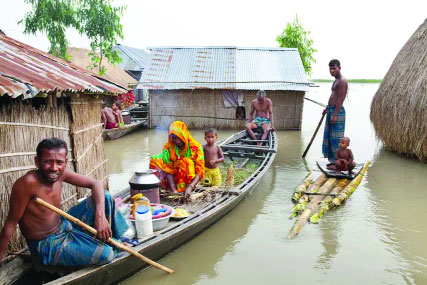Listen to countries like Bangladesh: Bachelet
Act now on climate front
Rising temperatures, heat stress already affecting rice production
in parts of Bangladesh
Industry Desk: United Nations High Commissioner for Human Rights Michelle Bachelet has said the international community “must heed” the voice of specially affected countries like Bangladesh and act to deploy every possible resource to make the human right to a healthy environment a reality for all.
“Now is the time for action. We have spoken a lot, and we must walk the talk,” she said hours before wrapping up her four-day visit to Bangladesh on Wednesday, urging the international community to listen to countries like Bangladesh and act with “unity, purpose and solidarity”.
Bachelet said they know what they need to do, the challenge is moving their political leaders at international level to the point where they realise that the costs of inaction are far higher than those of doing the right thing.
She hoped that in the next steps and at the international level, including at the end of the year in the discussion of the post-2020 biodiversity framework, that the international community will take steps to walk the talk and not to just discuss in closed rooms about this. “So as I said, we know what we need to do. We need political will to move forward on this.” While speaking at a programme titled “New Frontiers of Human Rights: Climate Justice in Perspective” organized by Bangladesh Institute of International and
Strategic Studies (BIISS) at the BIISS auditorium the UN rights chief said, “So, we need to draw a new way of living, working and reaching our individual, collective potential in peace with each other and with our planet.”
She said Bangladesh is very much at the frontline of this issue, both in terms of the effects of climate change on the country, but also due to its vital role as an actor for change.
The World Bank estimates that Bangladesh may have almost 20 million internal climate migrants by 2050 – corresponding to roughly 12 % of the entire population of Bangladesh or the entire population of her own home country, Chile.
Specifically, with a projected 50 cm rise in sea level, as mentioned before, Bangladesh may lose approximately 11% of its land by then, and that would mean up to 18 million people may have to migrate because of sea-level rise alone.
“Climate change impacts access to food more broadly. Rising temperatures and heat stress are already affecting rice production in parts of Bangladesh,” Bachelet said.
She said Bangladesh has made important progress in meeting the SDGs on poverty and education. “I commend Bangladesh on its ambitious vision for economic development and with a view to graduating from “Least Developed Country” status in 2026.”
Bachelet said at the same time, stronger efforts are needed to meet SDG 5 on gender equality and SDG 10 on reducing inequality.
This includes working towards eliminating child marriage, tackling gender-based violence, ensuring the right of every child to education, and enacting both short- and long-term special measures to reduce income inequality, among other steps, she said.
In addition, Bachelet said, Bangladesh’s sustainable development efforts should occur in line with SDG 16 by promoting peaceful and inclusive societies, providing access to justice for all and building effective, accountable and inclusive institutions.
This includes strengthening the national human rights commission, the elections commission, the judiciary, expanding civic space for public debate (both on and offline) and ensuring civil society participation in the design and implementation of economic and social development plans, she mentioned.
President Joe Biden tests positive for COVID-19 while campaigning in Las Vegas, has ‘mild symptoms’
International Desk: President Joe Biden tested positive for COVID-19 while traveling Wedne…








